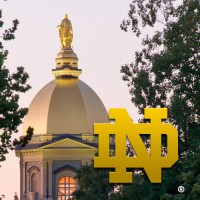
The Notre Dame Institute for Ethics and the Common Good (ECG) invites applications for its 2026–27 Faculty Fellowship program. We are seeking five scholars to join a vibrant, interdisciplinary cohort dedicated to advancing research on faith-based ethical approaches to powerful AI.
For futher explanation of this topic, including a list of potential research topics related to it, please see https://ethics.nd.edu/fellowships-and-grants/faith-and-ai-faculty-fellowships/.
In 2026-27, one Faculty Fellowship will be co-sponsored by the Liu Institute for Asia and Asian Studies. This fellowship will fund a project that connects with the topic above from a perspective in Asian studies.
The program is open to U.S. and international scholars at any career stage, including tenured faculty and postdoctoral researchers.
Faculty Fellows receive half their base salary per academic year (up to $80,000), a housing subsidy (for those who currently reside outside of the South Bend area), a research allowance of $1,000, and a private office at ECG. Fellows' home institutions provide the remainder of their salaries as well as all benefits, including health insurance.
Postdocs are welcome to apply and receive a stipend of up to $80,000 paid directly to them (rather than to a home institution). Postdocs are also provided health insurance benefits.
Faculty Fellowships are open to scholars who are conducting a substantial research project related to love-based ethical frameworks.
Note: Scholars seeking a faculty fellowship who are working on love-based ethical frameworks should apply here.
Applicants from all academic disciplines are encouraged to apply, including—but not limited to—philosophy, theology, psychology, sociology, political science, computer science, engineering, law, literature, and the arts.
While most Faculty Fellows hold academic appointments at colleges or universities, the fellowship is also open to independent scholars, journalists, artists, and others whose work aligns meaningfully with the fellowship theme.
The majority of fellowships will be awarded to scholars external to the University of Notre Dame. However, Notre Dame faculty are eligible to apply, and a limited number of fellowships may be awarded to applicants from within the university.
Postdoctoral scholars and advanced graduate students are welcome to apply, provided they will have completed all Ph.D. requirements by May 1, 2026, and are within five years of earning their degree.
We welcome applications from scholars who are based outside the U.S. We also welcome applications from scholars from a variety of faith and cultural traditions.
Fellows are expected to be in residence for the full academic year (August through May). Semester-long fellowships are generally not available.
All Faculty Fellows are expected to reside in the South Bend area and to remain in residence at the University of Notre Dame during the period of their fellowship (except for vacation periods, holidays, and University breaks).
Faculty Fellows are expected to be free of their regular commitments and to have their primary office at the Institute so they may devote themselves full time to the work outlined in their research proposal and participate fully in the community of scholars at the Institute.
Faculty Fellows are also expected to attend weekly seminars, present their research twice during these seminars, and attend ECG retreats, communications workshops, and other special events.
Applications for Faculty Fellowships must be submitted through Interfolio and should include the following:
Proposals will be evaluated on the basis of their potential for research impact, fit with the theme, and fit with the Institute’s mission.
Finalists will be asked to be available for a brief Zoom conversation with committee members during the final stage of the selection process.
The University of Notre Dame seeks to attract, develop, and retain the highest quality faculty, staff and administration. The University is an Equal Opportunity Employer, and is committed to building a culturally diverse workplace. We strongly encourage applications from female and minority candidates and those candidates attracted to a university with a Catholic identity. Moreover, Notre Dame prohibits discrimination against veterans or disabled qualified individuals, and requires affirmative action by covered contractors to employ and advance veterans and qualified individuals with disabilities in compliance with 41 CFR 60-741.5(a) and 41 CFR 60-300.5(a).
Background Check
This appointment is contingent upon the successful completion of a background check. Applicants will be asked to identify all felony convictions and/or pending felony charges. Felony convictions do not automatically bar an individual from employment. Each case will be examined separately to determine the appropriateness of employment in the particular position. Failure to be forthcoming or dishonesty with respect to felony disclosures can result in the disqualification of a candidate. The full procedure can be viewed at https://facultyhandbook.nd.edu/?id=link-73597.